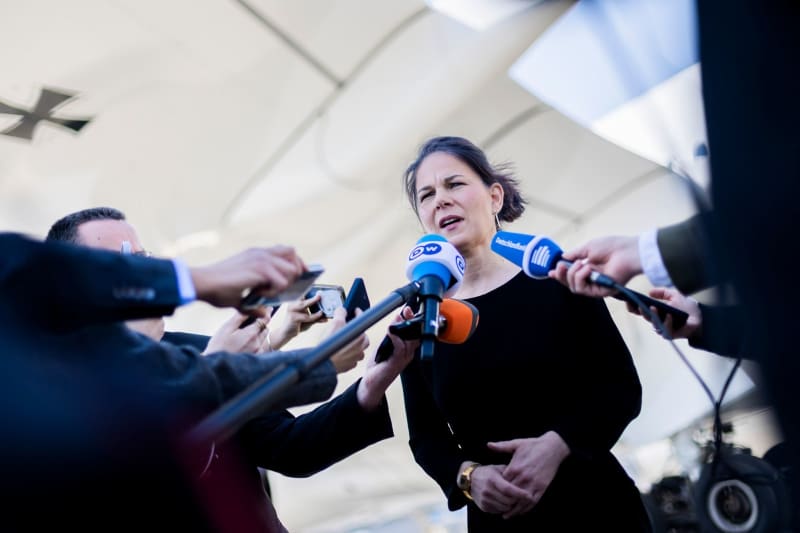“There must be no large-scale offensive on Rafah,” she said in Cairo on Monday after a meeting with her Egyptian counterpart Sameh Shoukry.
“People cannot disappear into thin air,” she said after another round of talks amid the increasingly catastrophic humanitarian situation in the Palestinian coastal strip.
According to estimates, 1.5 million of the 2.2 million inhabitants of the Gaza Strip are currently seeking shelter in Rafah from Israeli attacks on the coastal enclave.
Baerbock later also met with the leader of the Palestinian Authority (PA) governing the occupied West Bank, Mahmoud Abbas, in Ramallah.
The German minister praised the president and the PA for clearly condemning the violence of the October 7 attacks on Israel led by Palestinian extremist organization Hamas. This stance had been “an important contribution” to the UN Security Council’s decision to pass a resolution calling for a ceasefire in Gaza for the first time, she said.
The most powerful body of the United Nations was able to pass a resolution on Monday calling for an “immediate ceasefire” in the Gaza war for the Muslim holy month of Ramadan as well as the release of all Israeli hostages, after the US, Israel’s biggest ally, decided not to use its veto power.
The number of Palestinians killed in Israeli attacks surpassed 30,000 last month, with many more thousands injured, the Palestinian Health Ministry reported. The actual number of dead is likely to be much higher.
Baerbock also emphasized on Monday that aid deliveries by air and sea could only make a small contribution to the dire situation in Gaza. “What we need is to open up the land route.”
The Israeli government has a responsibility to guarantee access to food and water as well as safe escape routes, she said. The minister accused Israel of not making a strong enough distinction between military and civilian targets.
According to Baerbock, this and the terrible humanitarian situation are further fuelling terror in the Gaza Strip. “Hostages will not be freed while children in Gaza are currently starving to death.”
The United Nations has warned of an imminent famine, with around 1.1 million people in the Palestinian region in a desperate situation.
Later on Monday, Baerbock was set to fly on to Israel in what will be her sixth visit to the country since the Hamas-led attacks of October 7, in which about 1,200 people were killed.
A meeting between Baerbock and Israeli Foreign Minister Israel Katz is scheduled for Tuesday.
On Sunday, the German minister demanded that Israel and Palestinian militant group Hamas make concessions in ongoing negotiations in Qatar regarding the Gaza war and agree to an immediate ceasefire.
Israeli Foreign Minister Katz replied on X: “We expect our friends to continue to support Israel in these challenging times and not to weaken it against the terrorist organisation Hamas.”
Israeli Prime Minister Benjamin Netanyahu has pledged to move forward with the assault on Rafah despite international concerns.
While firmly continuing to back Israel’s “right to self-defence” after the October 7 attacks, Berlin has slowly grown more critical of Israel’s military actions in Gaza, in particular regarding the lack of aid reaching the civilian population.
Baerbock has been calling for a humanitarian ceasefire for weeks, in order to facilitate the release of the remaining hostages taken to Gaza on October 7 and increase the number of aid deliveries into the coastal area.
After meeting with Palestinian leader Abbas, Baerbock stressed the need for the PA to get access to Gaza, as well as the “certainty that Gaza and, above all, the West Bank are one.”
In this context, the ongoing construction of new Israeli settlements in the West Bank was constantly opening up “new gaps and therefore also security risks,” the German minister said.
“This is literally obstructing the two-state solution. It is literally obstructing peace.”
She also continued to campaign for violent radical settlers to face consequences.
According to media reports, Israel’s civil administration has declared 800 hectares of land in the West Bank to be Israeli land, with hundreds of settler homes to be built there. The Israeli settlements in the West Bank are illegal under international law.
